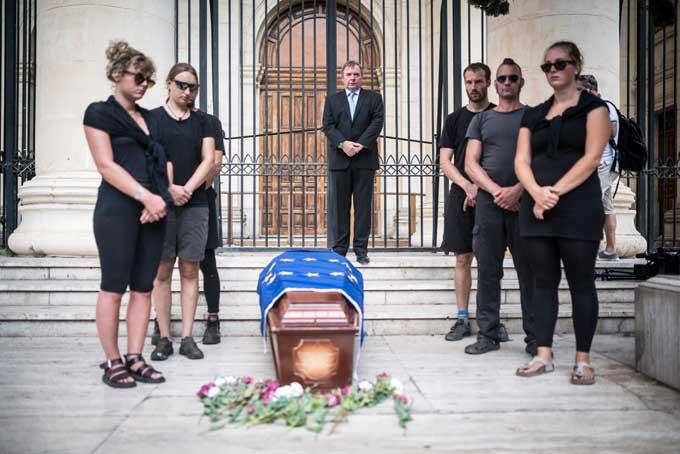At today's trial of Mission Lifeline's captain Claus-Peter Reisch, activists held a funeral march through Valetta and symbolically buried European human rights in a coffin.
Claus-Peter Reisch, 57, born in Munich Germany, was charged with, as captain of the vessel Lifeline, entering Maltese territorial waters illegally and without proper registration and a licence.
"Today marks almost two months of disgraceful behaviour by Malta and other European states, which is costing more lives every day," a statement by Sea-watch read.
"Captain Claus-Peter Reisch of Mission Lifeline saved 235 lives during a rescue mission in the Mediterranean Sea and is now being accused of doing so without a correct registration of the ship. Previous investigations have failed to support this claim, and we contest this attack as shameless political scapegoating in response to sea rescue NGOs highlighting failures in the EU's migration priorities and policies. It is evident that Malta is attempting to make an example of the LIFELINE, to keep NGOs from rescuing."

"Another clear indication of this strategy is the fact that the Sea-Watch 3 and the reconnaissance airplane Moonbird are also still being detained on Malta without any legal grounds. In doing so, the Maltese government is leaving people to drown in the Mediterranean Sea and is responsible for every death that occurs while rescue NGOs remain chained in its ports."
"Nobody would stop the fire brigade from extinguishing a fire on land because someone thinks that maybe the license plate could be the wrong one." says Captain Pia Klemp of the Sea-Watch 3.
"Captain Reisch did what everybody else would do and what is his moral and legal duty - he did not stand by while people were drowning in front of him. While European politicians have looked the other way for years now, we demand nothing but to follow the most basic principle that human dignity and the equal value of life are inviolable."

"We held this funeral to mark the death of human rights in Malta. This one funeral is merely a drop in the ocean compared to over 1500 deaths that have occurred in the Mediterranean since January, of those fleeing in search of safety," the statement read.
Thursday’s court sitting lasted only a few minutes. Prosecuting inspector Daryl Borg told the court that rogatory letters sent to the Dutch ship registration authorities had been returned because they had been sent on wrong forms.
The Attorney General's office will have to re-send them, he explained.
Magistrate Joe Mifsud, who is presiding over the case, expressed his disappointment over the waste of time. He said it was not right that the captain had to attend court hearings, travelling to and fro from Germany, for nothing.
Lawyer Cedric Mifsud, appearing for the captain, said the Lifeline was being held in port at a great expense while the court case dragged on.
The Magistrate asked the prosecution to inform the court once the letters arrived and apologized to the captain, saying he was embarrassed by this situation.
The case would have otherwise been settled in two weeks, the magistrate said.
AG reaction
The Office of the Attorney General wishes to clarify that the letter of request in question was sent to the Office of the Attorney General by the Court of Magistrates in terms of article 399 of the Criminal Code for onward forwarding to the Dutch competent judicial authorities. The said request was forwarded by the Office of the Attorney General to the competent Dutch judicial authorities immediately.
On their part, the Dutch judicial authorities, upon receipt, informed the Office of the Attorney General that since the introduction of the European Investigation Order (EIO), the national law of the Netherlands (not European Union law) was amended so that the competent authorities in the Netherlands now only accept EIOs and not letters of request from EU States. The Netherlands authorities therefore requested the Maltese authorities to send the request in the format of a European Investigation Order. The Maltese authorities took immediate action to comply with the requests of the Dutch judicial authorities in order to ensure the swiftness of the criminal proceedings in Malta.
It is worth noting that such occurrences are not at all uncommon when national laws vary and that since the adoption of the EIO framework decision, the Maltese authorities themselves still receive and send numerous letters of request from or to other EU Member States and all of them are executed.